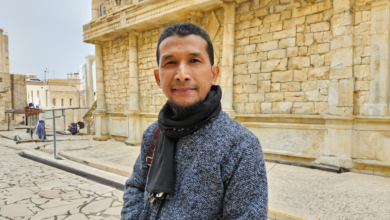
 ISLAM religion in accordance with human nature. Therefore, all Islamic teachings can be implemented by humans, as well as practiced by the Prophet Muhammad, the sahahat, tabi'in, salafus pious, and pious people until now.
ISLAM religion in accordance with human nature. Therefore, all Islamic teachings can be implemented by humans, as well as practiced by the Prophet Muhammad, the sahahat, tabi'in, salafus pious, and pious people until now.
The preachers or scholars should show that ease, not make Islamic teachings difficult to practice. The process, stages, and priorities of charity in Islam must be socialized (preached) to the ummah.
Islam is not here to make people difficult, but to make life easier and easier for them.
"Allah wants convenience for you and does not want trouble for you" (QS. 2: 185).
"Verily Allah SWT. not sending me to make it difficult or aggravating, but as a teacher who makes it easier " (Narrated by Muslim).
"Indeed, Allah likes it when His relief is used, as He hates it when disobedience to His commandments is carried out" (Narrated by Ahmad, from Ibn 'Umar ra.).
As befits a "road guide", Islam makes it easier for humans to lead to happiness in the world and the hereafter. If a human feels difficult in his life, it is certain, because he does not comply with Islamic guidelines. What makes Islam feel heavy and difficult is ourselves, the more emphatically our passions.
In a number of His words, Allah Almighty emphasized that Islam is not meant to trouble or burden humans.
"And actually we make it easy Al-Quran for lessons, then is there anyone who took lessons? " (QS. 54: 17).
"We did not send down this Qur'an to you so that you will be troubled”(QS. 20: 2).
"Allah wants convenience for you, and does not want trouble for you" (QS. 2: 185)
The above verses clearly say, distress, pain, hardship and misery are not concepts advocated by Islam (Al-Quran). Islam is for human convenience and happiness.
"And whoever does good, man or woman and he is a believer, truly We will turn him on with a good life" (QS. 16: 97)
In Islamic principles, all orders, responsibilities, and burdens are made and carried out according to human capabilities. Allah Almighty will not burden His servants but are adjusted to human abilities.
"Allah will not burden someone but according to his ability ..." (Surah Al-Baqarah: 286).
Imam Ibn Qayyim stated, "The essence of Islamic teachings is all contained rahmah and wisdom. If anything comes out of meaning rahmah to be violent or out of meaning wisdom into vanity, means that it is not included in Islamic teachings. Even if it was entered by some people, it would be a mistake. "
In a hadith Qudsi Allah SWT. said: "Indeed, Allah likes it when His relief is used, as He hates it when disobedience to His commandments is carried out" (Narrated by Ahmad, from Ibn 'Umar ra.).
On a long journey, the Prophet saw a friend who looked lethargic, weak, and looked heavy. He immediately asked why. The other friends replied that the person was fasting. So the Prophet Muhammad immediately emphasized:
"It is not a virtue to fast on the (long) journey" (Narrated by Ibn Hibbân, from Jâbir bin 'AbdilLâh ra.)
Islam does not endorse difficult religious practices. It is mentioned in a history that when he was carrying out the pilgrimage, Rasulullah Saw noticed a friend who looked very tired, weak, and suffering. So he also asked why. It turned out that, according to the stories of other friends, this person had a vow to go on the pilgrimage on foot from Medina to Mecca. So the Prophet Muhammad immediately told:
"Actually Allah does not need an act of torture himself, like that done by that person" (Narrated by Bukhâri and Muslim, from Anas ra.).
Thus, Islam as a religion rahmatan lil '' alamin strongly reflects the aspects of wisdom and convenience in his teachings. We, as Muslims, have been chosen by Allah SWT to enjoy these conveniences.
As told by 'Aisyah ra. that Rasulullah Saw in his daily life, when he had to determine between two things, he always chose the one which was easier, as long as it was not included in sin (Narrated by Bukhari and Muslim).
In terms of prayer, for example, Islam provides relief with the concept of jama 'and qoshor for travelers or for migrants. Likewise in emergency situations, Islam permits prayers to be performed in various ways: standing, sitting, even lying down. Allah knows best. (ed / ddhongkong.org).*



